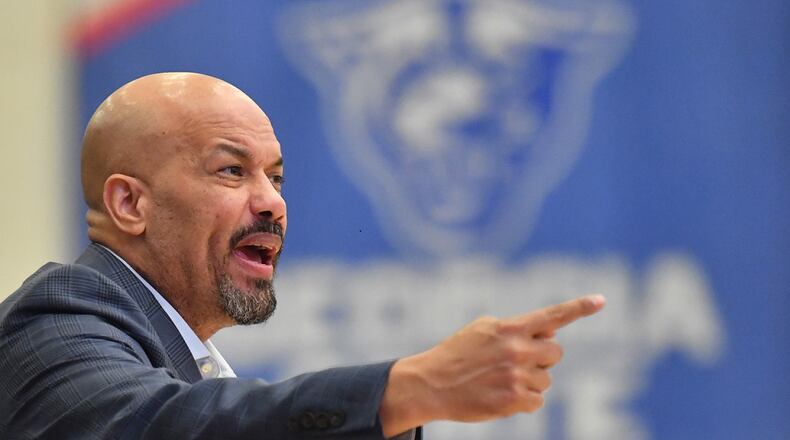Following an 84-78 loss to Troy on Saturday afternoon, Georgia State coach Rob Lanier issued a challenge to his talented backcourt, focusing on one crucial area for improvement: leadership.
“I think collectively the guys who play the most minutes and score the most points and have the biggest roles have to start to lead and communicate as leaders,” Lanier said. “It’s an area we need to get better at.”
The Panthers (15-8, 8-4 Sun Belt) not only needed backcourt leadership Saturday, but have been trying to develop it throughout Lanier’s first season as head coach. Specifically, Georgia State has been looking for its backcourt to grab the reins in late game situations.
The trio of guards that Lanier challenged to lead have become some of the more fearsome players in the conference. Although their court leadership isn’t fully developed, the on-court play of sophomore Justin Roberts and juniors Corey Allen and Kane Williams is the reason for Georgia State’s success.
Allen leads the team in scoring, averaging 15.3 points per game, with Roberts close behind him, averaging 13.4 points and 4.2 rebounds per game. Williams ranks third in scoring and averages a team-high of 4.4 assists per game.
“I feel like I’ve grown a lot,” Allen said. “I haven’t had a trio like this since I was in high school. Us working together is great because we’re all great players, and we can make big time shots.”
Roberts and Allen are unique in that the current season is their first season of eligibility at Georgia State. Both transferred and sat out last season, with Roberts leaving DePaul and Allen moving from Detroit.
The guards transferred into former Georgia State coach Ron Hunter’s program, before Hunter accepted a job as the head coach at Tulane. Roberts, who went to the same high school in Indianapolis as Hunter’s son, RJ, credited his relationship with Hunter as a large reason for his transfer.
Even with initial disappointment at Hunter’s departure, Roberts saw an opportunity to thrive in Lanier’s system.
“I just knew that whatever happened, that I had to be ready to play my game,” Roberts said. “I took it on as a challenge just to get better and for whoever was going to come in here, to make them play me.”
While Allen and Roberts embraced the coaching change, which included a scheme switch to full-court man-to-man defense, the two have yet to fully assume their leadership roles.
The Panthers have lost four conference games, and all by 10 points or less, which has left them at second place in the Sun Belt standings with eight regular-season games remaining. However, Lanier feels that some of the close losses have been necessary for his developing backcourt to learn from.
“Leadership is definitely a big-time work in progress for both (Roberts and Allen). They’re both very competitive young men,” Lanier said. “I think they both have a love for the game and a work ethic that’s going to continue to sustain them in college.”
The guard group committed to developing as leaders earlier in the year and have pushed each other in practice as of late, focusing on their on-court communication.
Even with the outstanding strides that Roberts and his counterparts have made in their individual play, he claims that the backcourt trio isn’t content to just put up great numbers.
“Coach Rob told us that we got that rope when it comes to scoring and other things. Having that rope, actually comes with a responsibility to hold everyone accountable, even yourself,” Roberts said. “With us being guards, we have to be vocal because he’s telling us what to do, and then we’re supposed to tell the rest of the team. Just being more vocal and being more of a leader is really the goal. We’re never really satisfied.”
While the ultimate goals for Georgia State basketball are a Sun Belt championship and NCAA tournament bid, Lanier acknowledges that this season is a part of a much longer process. In his first season at the helm, he knows that it will take time to establish his own system and fully groom his players into on-court leaders.
“I think, at some point, there will be a point in time where they internalize what we do as the identity of Georgia State basketball as opposed to a directive from the new coach,” Lanier said.
“I think we’re entering into that space, where this is what we do, this how we win, this is how we play, these are the values that we emphasize. Over time, I think we’ve bought in and now we’re starting to internalize things on a deeper level.”
Lanier hesitated.
“But we’re not there yet.”
About the Author
The Latest
Featured


